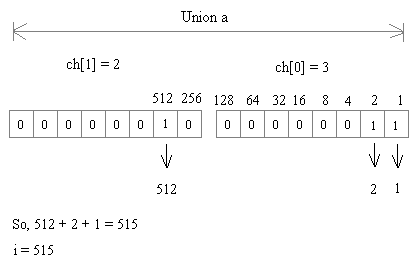| 1. |
|
|||||||
Answer: Option B Explanation: printf("%d, %d, %d\n", u.ch[0], u.ch[1], u.i); It prints the value of u.ch[0] = 3, u.ch[1] = 2 and it prints the value of u.i means the value of entire union size.
So the output is 3, 2, 515. |
Post your comments here:
Name *:
Email : (optional)
Your comments will be displayed only after manual approval.
